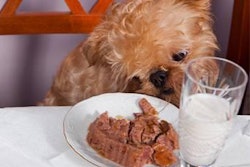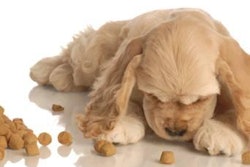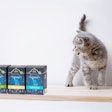High-protein, low-carbohydrate (HPLC) diets are common in cats, but their effect on the gut microbiome has been ignored. The study was conducted to test the effects of dietary protein:carbohydrate ratio on the gut microbiota of growing kittens. Male domestic shorthair kittens were raised by mothers fed moderate-protein, moderate-carbohydrate (MPMC) or HPLC diets, then weaned at 8 weeks old onto the same diet.
The protein:carbohydrate ratio affected fecal bacteria. Fecal Actinobacteria were greater and Fusobacteria were lower in MPMC-fed kittens. Fecal Clostridium, Faecalibacterium, Ruminococcus, Blautia and Eubacterium were greater in HPLC-fed kittens, while Dialister, Acidaminococcus, Bifidobacterium, Megasphaera and Mitsuokella were greater in MPMC-fed kittens.
Principal component analysis of fecal bacteria and blood metabolites and hormones resulted in distinct clusters. Of particular interest was the clustering of blood TAG with fecal Clostridiaceae, Eubacteriaceae, Ruminococcaceae, Fusobacteriaceae and Lachnospiraceae; blood ghrelin with fecal Coriobacteriaceae, Bifidobacteriaceae and Veillonellaceae; and blood glucose, cholesterol and leptin with fecal Lactobacillaceae.
The protein:carbohydrate ratio affects the fecal microbiome. Results highlight the associations between fecal microbes and circulating hormones and metabolites that may be important in terms of satiety and host metabolism.
Source : S. Hooda et al., 2012. The gut microbiome of kittens is affected by dietary protein:carbohydrate ratio and associated with blood metabolite and hormone concentrations. Br J Nutr online August 2012. doi: 10.1017/S0007114512003479


















